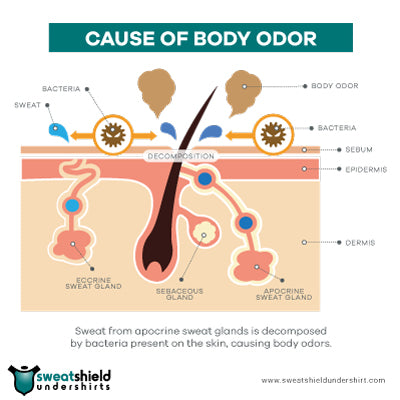Because hyperhidrosis is characterized by sweating profusely, many people wonder if this brings about odor issues.
The answer to this is slightly paradoxical: yes, hyperhidrosis makes you smell, and no, it doesn't.
To understand why this is so, it's important to understand how body odor arises in order to learn how we can keep it under control.
What Causes Sweat Odor?
Odor brought about by sweat can be traced back to sweat glands.
There are two distinct types of sweat glands in the human body: apocrine glands and eccrine glands.
What's the Difference Between Apocrine and Eccrine Glands?

The apocrine glands are found in the armpits as well as the genital region. They produce a liquid that is usually thick, viscous and invisible.
While it has no odor of its own, once this liquid comes into contact with bacteria on the surface of the skin, an unmissable and potent smell emanates.
On the other hand, eccrine glands produce odorless, waterless sweat in high quantities. They are numerous and found predominantly in the:
- forehead
- palms
- cheeks
- feet
- armpits
In most cases, people suffering from primary hyperhidrosis don't grapple with body odor. The term 'primary hyperhidrosis' is used when the condition isn't related to other medical conditions or the use of medication.
Why isn't odor usually an issue? Most of the sweat produced by those suffering from hyperhidrosis is secreted by the eccrine glands.
Moreover, this sweat usually washes away any bacteria on the skin produced by the apocrine glands.
All the same, body odor can still occur. This may happen as a result of irregular sweating, which would let the sweat dry on certain areas of the skin.
In such instances, apocrine sweat would wind up coming into contact with bacteria on the skin surface, producing odor.
How Can Sweat-Related Odor Be Stopped?
Should you find yourself affected by odor, there's one course of action that should be taken regardless of the odor issue being brought on by hyperhidrosis or not.
This is the use of antiperspirants to keep affected body areas dry. You can also change clothing frequently to prevent the accumulation of sweat and the odor this can cause.
Other than keeping dry, you can also fight odor by:
- regularly using antibacterial soap
- trying a change in diet
- using deodorant to reduce the intensity of odor
However, should these steps fail to make a difference, it is important to consult a medical professional (e.g., a dermatologist) who would better understand your condition and give appropriate advice.
Sometimes odor may severely affect the feet. This may be a bigger issue than the presence of normal skin bacteria.
Problematic foot odor is caused mostly by the overgrowth of a different kind of bacteria. These microorganisms have an affinity for the naturally moist and warm nature of human feet. This type of hyperhidrosis is called plantar hyperhidrosis.
To resolve the issue, you must tackle the bacteria as well as the moisture that collects on the feet.
Keep moisture in check by frequently changing your socks and shoes.
ou may also use medical powders. Powders are used to address excessively wet feet, as they are able to absorb the extra moisture. Some are also scented to leave the feet smelling pleasant.
Shoe inserts can also be used in absorbing excess moisture. They help prevent feet from slipping and keep shoes drier for longer.
To keep odor-causing bacteria under control, wash the feet with an antibacterial soap. In addition, do away with any moist, smelly shoes and socks.
How Is Hyperhidrosis Treated?
Beyond the control measures discussed above, which help make living with hyperhidrosis more manageable, there are mid- and long-term treatment options.
These include (but are not limited to):
- Botulinum toxin type A (Botox) injections, which are safe and effective
- Oral or topical antibiotics
- Iontophoresis, which stuns sweat glands using a low-voltage electric current
- Microwave energy used to kill sweat glands permanently (miraDry)
- Minimally invasive surgery (thoracoscopic sympathectomy)
Don't suffer in silence.
Given the sensitivity of the condition as well as the range of options available, it is best to see a dermatologist who will help you choose the most suitable treatment.
Keep in mind that while hyperhidrosis can have adverse effects on your well-being, it can be managed and treated, allowing you to enjoy your life to the fullest.
Stay Dry
To avoid sweat-related discomfort and anxiety, try a highly absorbent undershirt from Sweatshield.
Our high-quality undershirts and clothing line can help combat intense sweating and moisture.
Sweatshield leaves you free to go about your day without any sweat-related worry.
Photo: Freepik









